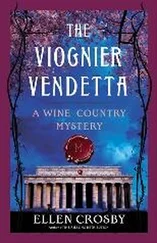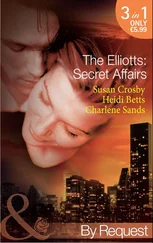When my parents were first married, my mother had redecorated the study and she’d gone a bit mad in her use of the Montgomery tartan. Our ancient tartan was a lovely subdued heathery green-and-blue plaid, but for some reason, she’d decided to use only the modern tartan, a bold red-and-green plaid on a lavender background. She’d put it on the sofa, the recliner, an ottoman, and even the curtains. It was a lot of tartan in one room, even one as high-ceilinged and imposing as this one. Now, though, it was only evident in the faded sunbleached curtains. Everything else was covered with papers and books. The only place to sit was Leland’s desk chair.
I found his appointment book on top of a pile of books on the edge of the desk, opened to the date he died. I shuddered as I leafed through it. He’d never been much for keeping records. A few names—the Romeos, mostly—scribbled on some pages, but that was it. I closed the book and sat down in the chair, sneezing in another storm cloud of dust.
The edge of the hunter-green notebook-style checkbook we used for vineyard business stuck out from under a pile of unopened mail. “Final notice” was stamped in heavy black letters across an alarming number of envelopes. After my mother died Leland had moved the winery’s records from her study to his, and her tidy files and meticulous bookkeeping had quickly disintegrated into chaos. I slid the checkbook out from under the bills. There were dozens of missing checks with nothing written against them in the ledger. Half a dozen unopened bank statements had been stuffed in the back of the checkbook.
No way to tell if we had eight hundred dollars in the account—or eight cents. I reached for the telephone—under a copy of the Wine Spectator —and set it on my lap. We did our banking where everyone in Atoka banked, at Blue Ridge Federal. The private phone number for Seth Hannah, who handled our account, was written in my mother’s handwriting in the flyleaf of the address book, which I found in the top desk drawer. Seth’s secretary put me through right away.
“Lucie honey, there’s just over four hundred dollars in that account as of today,” he said immediately. He sounded friendly, but not happy. “You’re a bit late with your loan payments, as well.”
We had a loan. Wonderful.
“I’ll get it to you, Seth. I promise. But couldn’t you advance us just a little more to get us through harvest?” I asked.
“I’d like to, darlin’, but I’m afraid that dog just don’t hunt anymore. I’ll give you a little extra time to make your payment, though. That’s as much as I can do.” He paused. “I hear you’re going to sell the place, so I reckon we can settle up then.”
This probably wasn’t the moment to tell Seth we weren’t going to sell, so I didn’t. Instead I thanked him sweetly for throwing us a lifeline, although in reality what I’d probably gotten was more rope to hang myself.
Then I called my bank in France. At least I could get the few thousand dollars of remaining insurance money transferred back to the States.
I knew the woman who answered the phone. Gisèle. She sounded flustered and asked me to wait un petit instant . After a few thousand “instants” Bertrand Thayer, the manager, got on the line.
He sounded confused. “Mademoiselle, we closed that account for you yesterday,” he said. “Monsieur Broussard gave me your letter stating that you returned to the États-Unis and wanted him to withdraw the money to send to you. Usually we cannot close an account without the owner being present, but under the circumstances, we did you this favor. Your ami was very persuasive.”
I was silent for a long time.
“Eh, bien, ” he said at last. “The letter had your signature on it, even the notaire, so we assumed it was genuine.”
“It probably was my signature,” I said, “knowing Philippe.”
“ Désolé, ” he said. “I’m terribly sorry. I don’t know what to say. Unfortunately he asked for cash.”
Cash. So like Philippe.
He’d cleaned me out.
The money was gone. Philippe had helped himself because he needed it and that was reason enough, as far as he was concerned. No doubt he was gone, too. The note I’d left him said I wasn’t sure when I’d be back from America and he probably took that as a golden opportunity to float, along with the other flotsam and jetsam with whom he kept company, to some friendly new port. Of course she would have money, and Philippe would charm his way into her bedroom, putting him on a fast-track to her wallet. He did some of his best work lying down.
The phone rang on Leland’s desk. I grabbed it before it rang a second time and answered in French, without thinking.
“ Oui, bonjour, yourself.” It was Kit and she was mad. “Have you read the Post today?”
“No,” I said. “It’s been a bit busy here.”
“Well, guess what? Someone gave them the full story on Fitz’s death and obviously didn’t put a gag order on them, either. Do you know what my boss said this morning? ‘If it’s news, it’s news to us.’ Did you talk to them?”
“He was my godfather, Kit.”
Silence. Then she said, “I’m sorry, Luce.”
“What did the article say?”
“That he was found floating in a tank of Merlot.”
“Oh God.”
“So was it Merlot?”
“Does it matter?”
“Whoever talked to the Post, it couldn’t have been that winemaker of yours,” she said. “I couldn’t get two words out of him.”
“I think it might have made the rounds at the Goose Creek Inn last night.” Mason said he’d heard from Elvis Harmon, who was dining with the Romeos. All that was lacking, probably, was the megaphone. “Some of the Romeos had dinner there.”
“The Romeos ? Aw, for crying out loud. Of course it was them. They can be a bunch of real old ladies sometimes, gossiping the way they do,” she said. “No wonder the Post got the story. Joby Matsuda eats at the inn all the time with that exotic dancer he’s been trying to get into bed with. He probably didn’t even need to interview anyone, just opened his notebook and listened.”
“The difference between the Romeos gossiping and you gossiping would be…what, again?”
She said a bit stiffly, “It’s an open secret about Joby and that woman. The only one who doesn’t know is his wife. And we’re off topic.”
“It was Merlot and it doesn’t really matter.”
“Meet me for lunch? We should talk.”
“I can’t,” I said. “I’ve got an errand in Middleburg.”
“I’m driving over there myself. The deli. Twelve-thirty.”
“You’re going to grill me for this story, aren’t you?”
“Of course not.”
“You lie.”
“I’ll buy.”
“I’ll come.”
“Good. See you there.”
On my way out of the room I stopped and removed the water-color of Hugh Montgomery’s gravestone from its hook on the paneled wall. Unlike everything else in here, there was no dust on the picture or the frame. Someone had done just what I had done, and not long ago, either.
More than likely it was Fitz. He’d probably wondered—as I did—whether it was a random choice that she used that note card or whether the painting held some clue about the location of whatever the key unlocked. I turned the painting over. Fitz, or whoever it was, already would have found a note or anything else she’d left tucked between the frame and the canvas. I checked anyway.
Just her signature, written lightly in pencil, and the vineyard’s twining vine logo, which she’d designed.
I replaced the painting and met Dominique in the foyer. Her phone was clamped to her ear and she was giving orders. She nodded when she saw me, pantomiming that I should meet her at the winery.
Читать дальше












